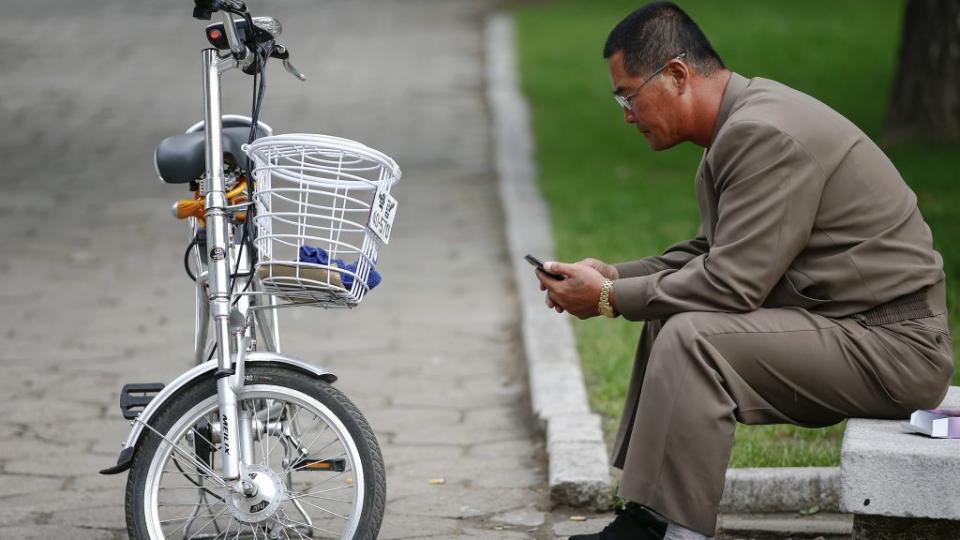In North Korea, the app store is an actual store

In true Orwellian fashion, North Korea’s tightly controlled intranet is called “kwangmyong,” or, loosely, “light.” Its rays are said to shine on fewer than 200 websites run by the government, according to the AP, and it’s the only “web” that most citizens can surf, although the top-tier of the country’s leadership can access the actual internet.
Despite its limited reach, urban North Koreans have embraced the kwangmyong and the domestically made mobile devices that can connect to it. Recently, sales of a smart-ish phone that looks a lot like an iPhone, and a tablet called the “Ryonghung iPad” have been brisk. The operating systems are said to be similar to Apple’s OS. (As you might surmise, Kim Jong-un appreciates Apple products, but not international trademark laws.)
The phones come preloaded with a browser, and a few apps, including a photo app and a popular card game. Adding more software requires a protocol unique to the Democratic People’s Republic of Korea.
Rather than exploring an app store online and downloading software, North Koreans need to go to a bricks-and-mortar location where they can purchase apps for the equivalent of a few dollars. That store, or perhaps kiosk, is on the second floor of the Pothonggang Information Technology Center, the AP reports. Here, customers hand their phone over to a store clerk who downloads the purchases either by Bluetooth or cable conncetion. (Accounts vary.)
For obvious reasons, this app store was of special interest to Erick Tseng, director of product management at Facebook, when he visited North Korea in 2015. Chronicling his tour there in a Medium post, he recalls a conversation he had with his North Korean minder after she had demonstrated a mosquito repellent app on her phone. It emits a high-pitch noise to deter the pests. She had also called up a pocket reference guide to Kim Il-sung’s teachings. As Tseng wrote:
Me: So you have an App Store?
Minder: Yes.
Me: Awesome! Can I see it?
Minder: No.
Oops! At this point, I was afraid I had crossed one of the many invisible lines in North Korea, and accidentally stepped into an Off Limits Zone.
Me: Oh, I’m sorry. Am I not allowed to see it?
Minder: No, it’s not that. It’s just not here.
Me: Not here? I don’t understand. Where is it?
Minder: Well, it’s a store. We would have to go there.
Me: Wait, your App Store is a physical store?? <pause, as I digest this incredible information> Can we visit one?
Minder: No, it’s not on our itinerary.
“Mind officially blown,” Tseng later wrote.
Since 2012, the number of North Koreans with mobile-phone subscriptions has quadrupled: The country now has about four million, according to the Wall Street Journal. That estimate still only represents about one sixth of the population.
Although the app store is offline, online commerce exists in the DPRK. In fact, the government runs an online store that recently began promoting free 24-hour delivery, something that would only be feasible in the capital, sources familiar with the country’s state of development told NK News. Nevertheless, the service appears to be another sign of Kim Jong-un’s dedication to spurring more domestic economic activity while also creating the impression that his people enjoy all the same luxuries as other citizens of the world.
All activity carried out on mobile devices is monitored by the government, as the Journal also reports, and all mobile software is watermarked to label it as state-approved. Downloaded software is also watermarked to be traceable. Outside apps simply can not be downloaded onto a phone that say, traveled to South Korea during next month’s Winter Olympics.
The phone’s data presumably belongs to the government, too—a situation that westerners would never tolerate. We’re only complacent about multinationals tracking our every move.
Read next: There are 5,000 tunnels under North Korea, and US soldiers are training to fight in them

Sign up for the Quartz Daily Brief, our free daily newsletter with the world’s most important and interesting news.
More stories from Quartz:

 Yahoo Finance
Yahoo Finance 